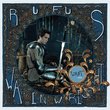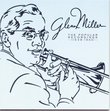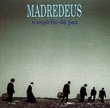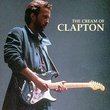| All Artists: Nathan Gunn, John [Composer] Adams, Marin Alsop, Bournemouth Symphony Orchestra Title: John Adams: Shaker Loops; The Wound-Dresser; Short Ride in a Fast Machine Members Wishing: 2 Total Copies: 0 Label: Naxos American Release Date: 10/19/2004 Genres: Pop, Classical Styles: Vocal Pop, Opera & Classical Vocal, Chamber Music, Historical Periods, Modern, 20th, & 21st Century, Symphonies Number of Discs: 1 SwapaCD Credits: 1 UPC: 636943903124 |
Search - Nathan Gunn, John [Composer] Adams, Marin Alsop :: John Adams: Shaker Loops; The Wound-Dresser; Short Ride in a Fast Machine
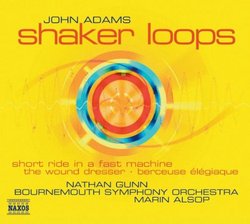 | Nathan Gunn, John [Composer] Adams, Marin Alsop John Adams: Shaker Loops; The Wound-Dresser; Short Ride in a Fast Machine Genres: Pop, Classical
Raised in Massachusetts and trained as a composer at Harvard, at the age of 24 Adams headed west to San Francisco in order to distance himself from his neo-European upbringing. Shaker Loops, written in the heyday of Americ... more » |
Larger Image |
CD DetailsSynopsis
Album Description Raised in Massachusetts and trained as a composer at Harvard, at the age of 24 Adams headed west to San Francisco in order to distance himself from his neo-European upbringing. Shaker Loops, written in the heyday of American minimalism, helped to earn him a place as one of the most famous living composers. It borrows the technique of looping fragments of melody from Steve Reich?s early tape experiments, and continues to be one of Adams? most frequently performed works. Also included on this disc is Short Ride in a Fast Machine, four minutes of pure aural adrenaline, and The Wound-Dresser, a pensive adaptation of Walt Whitman?s poem about his experiences as a nurse during the civil war. Marin Alsop has been Principle Conductor of the Bournemouth Symphony Orchestra since 2002. She represents the highest level of artistry seen in American conductors, and has recorded several times for Naxos. In 2003, she was named the Gramophone Artist of the year and presented with the Royal Philharmonic Society's conducting award. Marin Alsop has several more recording projects in progress for Naxos, including works by Glass, Weill and Bartók, as well as the complete Brahms Symphony cycle. Similarly Requested CDs
|
CD ReviewsExciting performances ruined in the mixing studio Marcus K. Maroney | 11/01/2004 (3 out of 5 stars) "There's no doubt about it - the Bournemouth Symphony Orchestra play brilliantly for the majority of the time in each of these pieces, and Alsop invests the music with great energy, due mostly to faster than usual tempos. Unfortunately, these tempo choices and some recording balance problems overshadow what otherwise would be a great addition to the John Adams discography. While not usually something I advocate, a look at the timings indicates just what to expect in Short Ride in a Fast Machine. Alsop's clocks in at 4:05, SFSO/de Waart, the Netherland Wind Ensemble, the Cincinnati College-Conservatory Wind Symphony/Corporon and CBSO/Simon Rattle all take 4:20 or longer. This seemingly antiseptic comparison is actually pretty important in a piece with unchanging tempo, and Alsop's very fast direction produces some pretty hectic sounding areas in the piece. It is exciting when one hears the first three clicks of the woodblock at such a speed (amounting to about 20 clicks per minute faster on a metronome), and the opening trumpet rhythms are wonderfully articulated, but there are later areas where detail is lost and it just sounds mushy (not something that would be the aim of this work, I think). There are also several balance problems that pretty much ruin the recording for me. The wood block(s) are simply too loud - the only way you would hear them sound like this in concert is if they were amplified, and that's clearly not indicated in the score. Perhaps Alsop and/or the engineers decided that this would add "clarity" to the recording, but it really doesn't (in fact, it gets a bit irritating after a while). Likewise, the change of wood blocks midway through, from quite high and piercing to low and somewhat-less-piercing, draws unnecessary attention to itself. The problem with overmiking the wood block(s) is that it feels like we're being spoon-fed the interest of this piece, which lies in the conflict derived from Adams' brilliant working of different rhythmic patterns against a steady beat. Since the piece starts with the woodblock alone spelling this beat off, it should be internalized and the actual sound should be barely audible, only sneaking through when allowed by soft dymanics in the rest of the orchestra. Contrarily, several great details are lost: the horn glisses at the first "crisis point", the tam-tam strokes at the climax (beautifully rendered in de Waart's recording) and any hint of the synthesizer that's called for in the score (again, audible in de Waart's recording). It is nice to hear such zealous piccolo playing, however out of tune it is. The only recording of this I don't know is the Masur/NYPO in their box. I would love peoples' opinions on this rendition. The Wound Dresser is similarly marred by balance problems - for his wonderful tone, diction and phrasing, Nathan Gunn is simply too closely recorded in relation to the orchestra. The result is that, even when you can tell he's singing softly, he still buries the orchestra. When he sings loudly, he's the only sound you can pay attention to. This is one of my favorite Adams pieces and I greatly enjoy Nathan Gunn's discography. In this account the piece completely loses any intimacy, which is abundant on the recording by Sanford Sylvan (Nonesuch), not a singer I'm typically fond of. I've listened to this recording on several sound systems just to make sure the close balances weren't a result of my equipment, and sadly they aren't. The two pieces without soloist (Short Ride sounds essentially like it has a solo woodblock throughout) come off quite a bit better. The warm transparency of the Bournemouth players works wonderfully in Adams' sensitive, dark-hued orchestration of Busoni's Berceuse élégiaque. This is my fifth recording of Shaker Loops (here performed in the string orchestra version), and it is quite good indeed. The energy is again produced mostly by tempos slightly faster than typical, and the string sections play wonderfully when given melodic bits. It is again slightly marred by the recorded sound, which, aside from the very opening of the work, never gets as soft as it does in other recordings. At many times, I prefer the original, rawer sounding version for seven solo players. Overall, the gutsy, exaggeratedly contrasted reading given by Christopher Warren-Green on an excellent collection of "minimalist" works on Virgin remains my favorite. $6.98 is certainly not too much to ask for a good recording of Shaker Loops, and the other performances on this Naxos release are certainly serviceable. It would have been nice, however, to have a recording of Adams' works that don't already exist in multiple versions - where is a second recording of one of his early masterpieces, Harmonielehre, for instance? I've always viewed Naxos as an excellent source of recordings of pieces not readily available on other labels, and they've been excellent in doing so with other releases in their American Classics series (such as the Bolcom set that is next in my "to listen to" pile). Is this disc a missed opportunity? I would unfortunately have to lean towards "yes" as an answer - undeniably wonderful pieces and probably wonderful performances ruined by poor choices in the mixing studio. " Terrific performances, with a few quibbles Jeff Abell | Chicago, IL USA | 01/13/2005 (4 out of 5 stars) "As an owner of the John Adams Earbox, and a bunch of other stuff as well, I guess I qualify as an official junkie when it comes to his work. So only the low sticker price convinced me to sample this new CD. But it was money well spent. Marin Alsop's conducting on this disk is energetic and committed, and really gets to the heart of the pieces. The burning-rubber tempo on "Short Ride in a Fast Machine" is especially great. There are some balance issues, as noted by other reviewers, which is the only reason to give this 4 stars instead of 5. I really bought this for Nathan Gunn's performance of "The Wound-dresser," which is one of Adams most heartfelt and emotionally profound works. The version with Sanford Sylvan, conducted by the composer, is a truly great recording, and sets a very high standard indeed. Gunn's voice is more of a true baritone, a darker, more "masculine" sound, and it's very appealing in this score. Overall, his performance is really excellent, and though he's miked a little too closely (or mixed a little too prominently, it's hard to tell), he interprets the piece with distinction. There's a couple of spots (hate to quibble, Nathan, but...) where he does some vocal things that annoy me. At the line, "Soon to be filled with clotted rags and blood," he does enunciates the bl-sound before rising up to the pitch, turning it into "buh-lud" and the effect is too melodramatic. (Compare to Sylvan's performance, and you'll see what I mean.) But that's picking nit on what is overall a fine performance from a really outstanding singer. I also think Adams own version of this score has an emotional arc that slightly eludes Alsop. It's an episodic piece, and though Alsop gets all the moments right, it doesn't seem to have the cumulative shape of the composer's own version. But that's hardly surprising, considering what a good conductor Adams is; he's hard to surpass in his own work. As I said, I'm happy to add these new readings to my ridiculously comprehensive collection of Adams recordings. For people new to his work, it's a cheap thrill, with the emphasis on the thrill." Four Revelations by Adams, Impressive Work by Alsop and Gunn Ed Uyeshima | San Francisco, CA USA | 12/01/2004 (5 out of 5 stars) "As a collection of John Adams' earlier works (1979-91), this is nothing sort of a revelation for me. Long associated with the American minimalism movement, Adams composes music which I tend to think of as alternately challenging and droning with unexpected flashes of brilliance. But what is truly unexpected here is the powerfully rich and communicative nature of all four works presented here.
Whirling dervish rhythms dominate the opener, "Short Ride in a Fast Machine", an apt title as it feels like an exhilarating sportscar careening on hairpin turns, yet with a lovely gravity that is almost Coplandesque. The second piece is the most impressive, truly a soliloquy for baritone and orchestra, "The Wound-Dresser" is a stunning twenty-minute piece set to a Walt Whitman poem describing in graphic detail the poet's experiences as a nurse during the Civil War. Propelled by baritone Nathan Gunn's astonishing vocals, it is deeply eloquent and moving, all the more impressive given the often brutal lyrics about tending to bloodied and maimed soldiers on the battlefield. I just saw Gunn's galvanizing performance in the title role of Benjamin Britten's "Billy Budd" at the San Francisco Opera, and it is gratifying to hear his commanding voice, letter-perfect diction and compassionate dramatic style take over this beautiful piece so fully. And Adams elevates the drama in such surprising ways, for example, the use of clarion bugles during the climax. The composer brings a fulsome gravity to "The Wound-Dresser" presaging his masterwork elegy to 9/11, "On the Transmigration of Souls" (also strongly recommended). The third piece is Adams' somber, poignant arrangement for chamber orchestra of an orchestral work by Ferruccio Busoni. The original, his Opus 42, dates from 1909, and it is a lovely homage from one composer to another. Here, in a more subdued manner, Adams seems to be continuing his theme of surviving through suffering started by "The Wound-Dresser"; it makes for a powerful combination. The last piece is Adams' earliest work here, and his more familiar minimalist style is far more evident with the pure string orchestra arrangement of "Shaker Loops". The athletic, almost edgy "shaking" effect of the first section is powerfully performed but not ad nauseum, and it's followed by a more stylized dramatic setting in the second movement "Hymning Slews" and the even deeper sense of revelation pervading the third section, "Loops and Verses". The final section brings the work full circle with a reinterpretation of the opening "shaking" that leads to a haunting fade-out. The conductor of the Bournemouth Symphony Orchestra and 2003 Gramophone Artist of the Year, Marin Alsop seems keenly aware of the drama and subtlety necessary to make this recording feel like one holistic work. She masterfully leads the Bournemouth orchestra, who respond by performing superbly. This is a remarkable recording, made all the more remarkable by the bargain basement price offered by Amazon, $6.98. My one quibble is incomplete documentation in the accompanying booklet. Strongly recommended." |

 Track Listings (7) - Disc #1
Track Listings (7) - Disc #1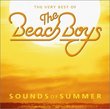
![Poses [Bonus Track]](https://nationalbookswap.com/cd//m/81/4481/574481.jpg)
